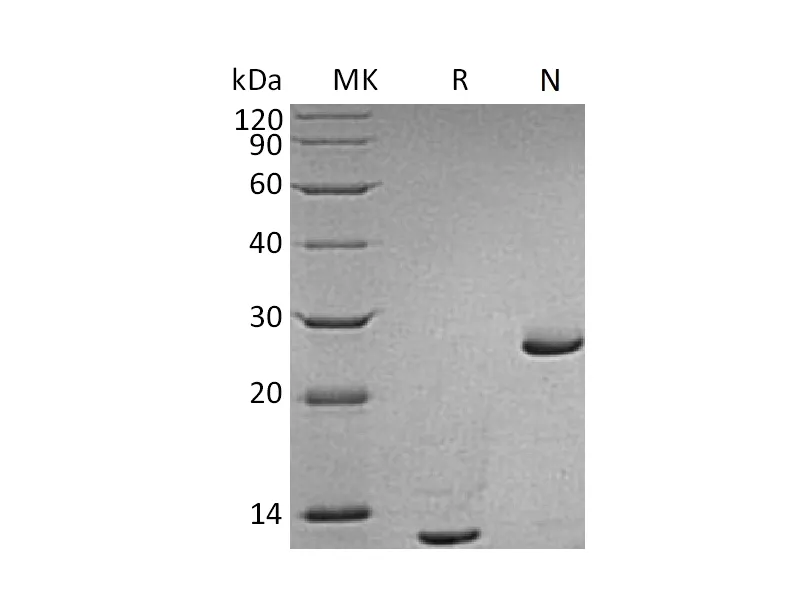
Size2:50μg price2:$465
Size3:500μg price3:$2325
| Name | Recombinant Human TGF-beta 2 |
| Purity | Greater than 95% as determined by reducing SDS-PAGE |
| Endotoxin level | <0.01 EU/µg as determined by LAL test. |
| Construction | Recombinant Human Transforming Growth Factor Beta 2 is produced by our Mammalian expression system and the target gene encoding Ala303-Ser414 is expressed. |
| Accession # | P61812 |
| Host | Human Cells |
| Species | Human |
| Predicted Molecular Mass | 12.7 KDa |
| Buffer | Lyophilized from a 0.2 μm filtered solution of 4mM HCl. |
| Form | Lyophilized |
| Shipping | The product is shipped at ambient temperature.Upon receipt, store it immediately at the temperature listed below. |
| Stability&Storage | Lyophilized protein should be stored at ≤ -20°C, stable for one year after receipt. Reconstituted protein solution can be stored at 2-8°C for 2-7 days. Aliquots of reconstituted samples are stable at ≤ -20°C for 3 months. |
| Reconstitution | Always centrifuge tubes before opening.Do not mix by vortex or pipetting.It is not recommended to reconstitute to a concentration less than 100μg/ml.Dissolve the lyophilized protein in distilled water.Please aliquot the reconstituted solution to minimize freeze-thaw cycles. |
Alternative Names
Transforming growth factor beta-2; TGFB2; Polyergin; G-TSF; Glioblastoma-derived T-cell suppressor factor; Cetermin; BSC-1 cell growth inhibitor; TGF-beta-2
Background
Transforming growth factor beta-2 (TGF-β2) is a secreted protein which belongs to the TGF-beta family. It is known as a cytokine that performs many cellular functions and has a vital role during embryonic development. The precursor is cleaved into mature TGF-beta-2 and LAP, which remains non-covalently linked to mature TGF-beta-2 rendering it inactive. It is an extracellular glycosylated protein. It is known to suppress the effects of interleukin dependent T-cell tumors. Defects in TGFB2 may be a cause of non-syndromic aortic disease (NSAD).
Note
For Research Use Only , Not for Diagnostic Use.
